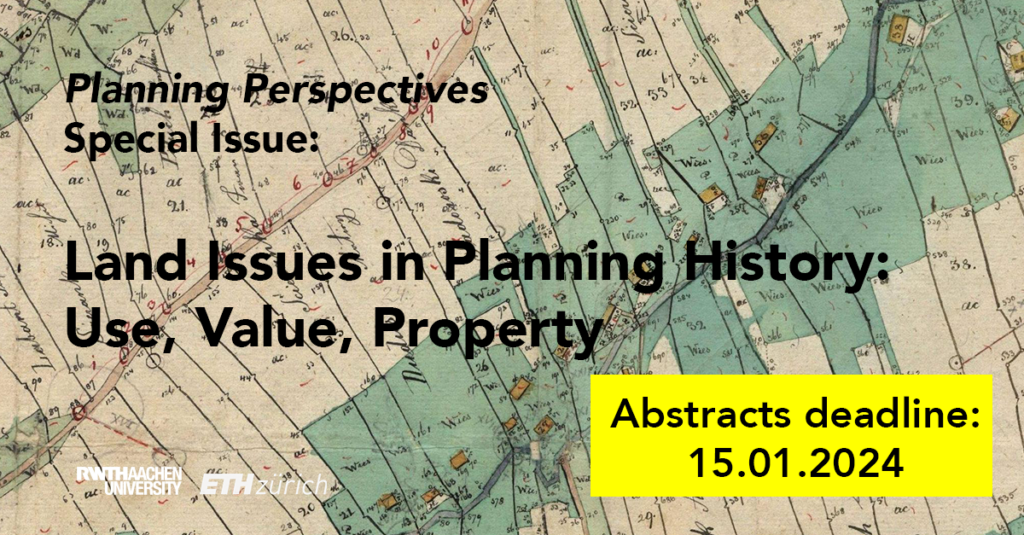
Guest editors: Dr. Dasha Kuletskaya, RWTH Aachen University, Germany; Dr. Franziska Kramer, RWTH Aachen
University, Germany; Dr. Susanne Schindler, ETH Zürich, Switzerland
When an urban planner draws a line, multiple things happen: the use of land is determined, property relationships are asserted and economic value is created. This powerful act is enabled by the underlying conceptions of land and ideas about its “highest and best use.” The history of urban and regional planning can thus be considered a history of thinking about land. In recent years, the unprecedented global increase in land and housing prices has—once again—thrust land-related questions into the spotlight of planning and architectural scholarship. The pressing issue of housing affordability in particular has fuelled a debate on potential solutions to curb land speculation. This debate spans the political spectrum, from calls for expropriation and nationalization to manifestos for the self-regulation of the ‘free market,’ as well as a growing interest in the concept of the commons. Regardless of their ideological vantage point, only few positions seek to transcend the binary opposition of state vs. private ownership of land or mediate between political extremes. And while scholars, activists and policymakers draw on legal, economic, social and political arguments with regards to land issues, they rarely consider their spatial dimensions. However, land issues always unfold in and are conditioned by space and are therefore implicit in any planning or architectural decision. For this reason, this special issue seeks to trace how land issues have been addressed in planning history. The call is motivated by the assumption that addressing the spatial dimensions of land issues in a historical perspective will contribute to nuancing an otherwise increasingly polarized political debate in the present.
To navigate the complexities of conceptualizing the spatial dimensions of land-related questions, the editors welcome submissions that focus on the concepts of value, use or property in relation to land. Possible questions include, but are not limited to: How do changing property regimes affect the production of space in longue durée? How does the parcellation of land relate to its use? How do urban design regulations interact with land valuation? How does building typology embody property relationships? In addition, the editors encourage contributions that explore the engagement of planning professionals, including architects and urban planners, in the political debates on land.
In the context of post-war reconstruction in Europe, for instance, land issues were particularly present in architecture and planning. Examples include debates on property rights on urban land during the CIAM IV congress of 1933, policy work of architect and urban planner Hans Bernoulli related to the communalization of land in post-WWII Warsaw, legitimization of land expropriation in East Berlin by architect Aldo Rossi, and the advocacy for land reallocation in post-WWII Le Havre by architect and urban planner August Perret. In all these cases, architects and urban planners directly or indirectly engaged with the concepts of value, use and property and provided spatial arguments for the inherently political debate on land. This is just one moment in history. To encourage a broader global perspective that extends beyond Western Europe and North America in the twentieth century, the editors especially welcome submissions that explore case studies that to date have been overlooked in academic literature. The aim of this special issue is to create a collection of interdisciplinary, empirically motivated papers centred around the concepts of value, use and property in relation to land issues in the history of planning.
Timeline:
Abstract submission: 15. January 2024
Abstract selection: 15. February 2024
Paper draft submission: 30. April 2024
Workshop for authors: 15. May 2024
Paper submission: 30. July 2024
Publication of the issue: June 2025
Please send your extended abstract (max. 1500 words) to:
Dr. Dasha Kuletskaya: kuletskaya@bauplan.arch.rwth-aachen.de
Dr. Franziska Kramer: fkramer@raum.arch.rwth-aachen.de
Dr. Susanne Schindler: susanne.schindler@gta.arch.ethz.ch
More information can be found in the full call for papers here.
